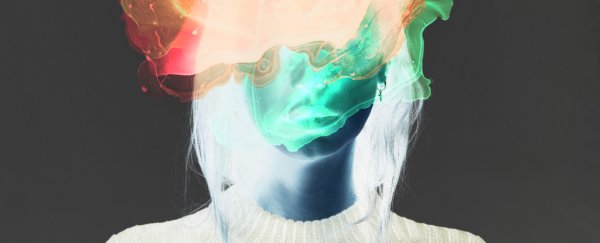The placebo effect is weird. When it takes place, people who haven't taken anything stronger than a sugar pill appear to respond as if they'd actually taken a real drug.
This strange phenomenon has been known for centuries, but remains something of a mystery, even though scientists are constantly finding out more about how this illusion might be staged.
One thing's for sure: the placebo effect can happen in a variety of medicinal scenarios, as a new study makes clear, suggesting that even mind-altering, psychedelic substances – or rather, the false belief you might have taken them – can bring on the effect.
In a bold sham of an experiment, researchers at McGill University in Canada recruited students to take part in a study ostensibly designed to examine the effects of a psychedelic drug called iprocin on people's creativity.
A total of 33 participants, who were paid a small fee for their time, completed the study in a lab designed to look like a party the Beatles might have once attended. Psychedelic artworks hung on the walls, lit by the coloured hues of therapy lamps. Mats and bean bags spilled out across the floor, while arthouse films were projected onto a screen, and a DJ played ambient tunes on a turntable.
In the midst of this hedonistic, free-spirited soirée, several in attendance were visibly tripping on the drug being given out, while numerous researchers in white lab coats paraded around, monitoring the experiment.
There was just one problem. None of this was real.
Iprocin is an actual synthetic drug, but it wasn't administered to any of the participants, who were all given placebos. The researchers wearing white lab coats, meanwhile, only wore them for show, in an attempt to look the part. And the people tripping in the crowd? Paid actors, entirely faking it.
The whole thing was set up to find out whether it's possible to prompt a psychedelic experience from nothing more than the power of suggestion and an inert placebo pill.
And it looks like it is possible. In questionnaires conducted during the experiment, over half (61 percent) of the participants reported feeling some effect of the 'drug' they had taken, including light-headedness, seeing colours shift on paintings, and feelings of relaxation, heightened senses, laughter, even nausea.
Many were absolutely convinced it was a psychedelic drug responsible for making them feel this way.
"It was a sinking feeling," one participant said. "Like gravity [had] a stronger hold on me or something… mostly [in] my head. Specifically in the back of my head."
Another reported what appeared to be visual hallucinations of some kind.
"I had not been feeling anything until looking at this [painting]," they recalled. "It's moving. The colours aren't just changing, it's moving. It's reshaping itself."
Not everybody felt the same way. Almost 40 percent of the group indicated they had felt nothing out of the ordinary during the experience.
But the fact that so many people were fooled into thinking they were high on a psychedelic substance is noteworthy, the researchers say.
"To our knowledge, these are the strongest alterations in consciousness reported in the literature following an inactive placebo psychedelic," the authors explain in their study.
Not that the goal of the experiment was to simply fool unwitting research participants.
Rather, the McGill team wanted to explore the under-studied phenomenon of 'contact highs', in which people say they feel the effects of drugs after being around people who have consumed drugs, even if they themselves haven't.
"Similar to placebo effects, these highs may result from classical conditioning as well as the physical and social setting," the researchers write.
These kinds of ideas date back to at least the 1960s, but given the contemporary revival of interest in psychedelic drugs for therapeutic purposes, the researchers think we might be able to exploit this apparent placebo effect, in ways that could benefit patients.
"The study reinforces the power of context in psychedelic settings," says psychiatry researcher (and former magician) Jay Olson.
"With the recent re-emergence of psychedelic therapy for disorders such as depression and anxiety, clinicians may be able to leverage these contextual factors to obtain similar therapeutic experiences from lower doses, which would further improve the safety of the drugs."
It's a noble goal. Even if it took some next-level trickery to get there.
Have no fear, though. When the nature of the ruse (and the study's real purpose) was explained to the group after the session ended, they responded with some shock and disappointment, but also laughter.
One of the participants, who "definitely felt [she] was high on something", even enquired as to where she could get ahold of the placebo drug again.
The findings are reported in Psychopharmacology.
